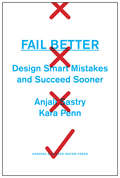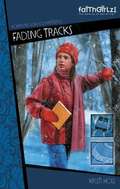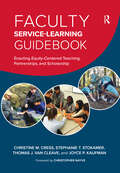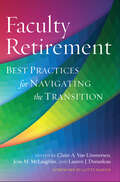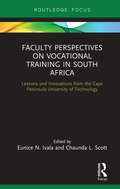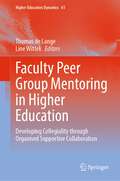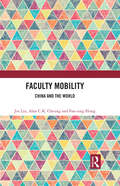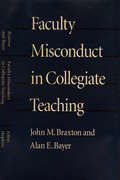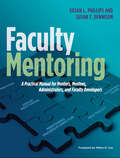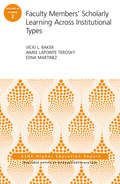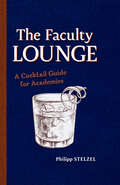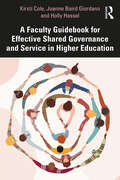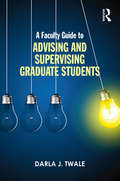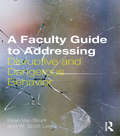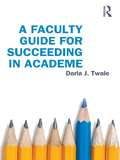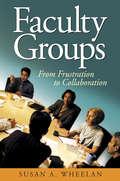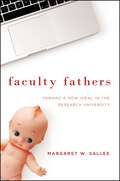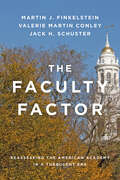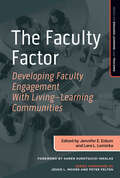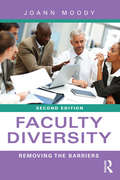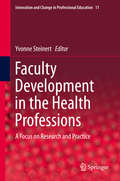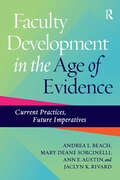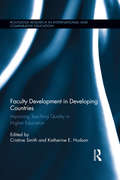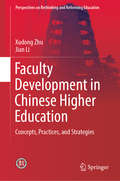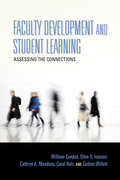- Table View
- List View
Fail Better: Design Smart Mistakes and Succeed Sooner
by Anjali Sastry Kara PennIf you’re aiming to innovate, failure along the way is a given. But can you fail better? Whether you’re rolling out a new product from a city-view office or rolling up your sleeves to deliver a social service in the field, learning why and how to embrace failure can help you do better, faster. Smart leaders, entrepreneurs, and change agents design their innovation projects with a key idea in mind: ensure that every failure is maximally useful. In Fail Better, Anjali Sastry and Kara Penn show how to create the conditions, culture, and habits to systematically, ruthlessly, and quickly figure out what works, in three steps: 1. Launch every innovation project with the right groundwork 2. Build and refine ideas and products through iterative action 3. Identify and embed the learning Fail Better teaches you how to design your efforts to test the boundaries of your thinking, explore crucial interdependencies, and find the factors that can shift results from just acceptable to groundbreaking-or even world-changing. Practical instructions intertwined with compelling real-world examples show you how to: Make predictions and map system relationships ahead of time so you can better assess results Establish how much failure you can afford Prioritize project activities for disconfirmation and iteration Learn from every action step by collecting and examining the right data Support efficient, productive habits to link action and reflection Distill, share, and embed the lessons from every success and failure You may be a Fortune 500 manager, scrappy start-up innovator, social impact visionary, or simply leading your own small project. If you aim to break through without breaking the bank-or ruining your reputation-this book is for you.
Fading Tracks (Boarding School Mystery #1)
by Kristi D. HollWhen the Landmark School for Girls' van carrying an art teacher and six students disappears near an ice-covered lake on the way back from a field trip, twelve-year-old Jeri desperately wants to help but everything she tries seems to make the situation worse.
Faculty Service-Learning Guidebook: Enacting Equity-Centered Teaching, Partnerships, and Scholarship
by Christine M. Cress Stephanie T. Stokamer Thomas J. Van Cleave Joyce P. KaufmanThis is a practical guide to designing, teaching, and coordinating service-learning courses, and for developing reciprocal community partnerships and community-based research through a lens of equity that addresses the endemic racial, social, economic, and environmental disparities across society. The text provides a comprehensive framework for developing both in-person and on-line service-learning, with a chapter on virtual delivery of courses that integrates the principles and practices described throughout the book. The authors uniquely integrate the how-to of conducting service-learning with the theoretical foundations to enact effective, equitable, and inclusive community engagement.Given this moment of enormous social inequality and divisiveness, the authors offer a new definition and set of educational principles that they characterize as Equity-Centered Community Engagement Excellence. These principles serve to guide academic and community engagement that is democratic, recognizes the voice and expertise of community partners, addresses the power imbalances between communities and academic institutions, and develops an educational experience that is potentially transformative and promotes civic responsibility.Informed by the literature of critical service-learning, critical race theory, intercultural communication theory, and social-constructivism, this book attempts to deconstruct the assumption of the preeminence of academic knowledge to reconstruct a new operational paradigm of equity-centeredness that validates community capacity to guide faculty in their redesign of service-learning curriculum, activities, collaborations, and scholarship. It is based on the principles of:·Student Agency (demonstrated as enhanced skills, knowledge, and motivation)·Community Efficacy (recognition of community assets and capacity-building)·Scholarly Advocacy (leveraging evidence-based research-based for equity-centered learning, serving, and social justice)The authors offer examples of syllabi, lessons and assignments, reflection questions, evaluation rubrics, as well as an array of teaching tips that illustrate strategies for use in the classroom and in the field.The book is addressed to faculty embarking on service-learning and to seasoned scholar practitioners looking for innovative ideas, as well as to campus administrators who coordinate community outreach or college student volunteer services, offering guidance on leveraging resources and fiscal support from external stakeholders. It is also designed to serve as a resource for professional development workshops and faculty scholar learning communities.It offers a rich compendium of ideas and examples from which faculty and practitioners can select exercises and elements to incorporate or adapt for their courses, whether designing short-term engagements or extended service-learning programs.
Faculty Retirement: Best Practices for Navigating the Transition
by Claire A. Van Ummersen Jean M. McLaughlin Lauren J. DuranleauCo-published with ACE.This book addresses the critical and looming issue of retirement in higher education as the cohort of boomer generation faculty come to the close of their careers. On the one hand institutions need to replenish themselves, and so need older employees to retire. On the other, mass retirements can decimate departments, creating the need for mass hirings that will create another crisis in the future.At the same time, with the elimination of mandatory retirement, many faculty are working on into and beyond their seventies because they feel they still have much to contribute, because their identities are closely tied to their work, because they wish to remain connected to their institutions, or for financial reasons. Given institutions’ legal constraints and planning exigencies, and faculties’ varied motivations, what are the options that can satisfy the needs of both parties? This book presents a range of examples of how institutions of all types and sizes are addressing these dilemmas, and how faculty members have helped create or shape policies that address their needs and allow them to continue to play meaningful roles at their institutions.The contributors describe practices that address the concerns of those already nearing or in retirement, propose approaches to creating opportunities to start these sensitive discussions and address financial planning at early career stages, and outline strategies for developing clear structures and policies and communication so that individuals have a full understanding of their options as they make life-changing decisions. This book presents models from fifteen colleges and universities identified by the American Council on Education through a competition for having developed innovative and effective ways to help faculty transition into retirement. It offers clear messages about the need for greater transparency in addressing retirement and transitions, for better communication, and for close coordination between human resources and academic administrators. It offers a roadmap for HR personnel, senior administrators, department chairs, and faculty themselves.
Faculty Perspectives on Vocational Training in South Africa: Lessons and Innovations from the Cape Peninsula University of Technology
by Eunice N. Ivala Chaunda L. ScottThe Cape Peninsula University of Technology (CPUT) is one of four Universities of Technology established by the South African government in 2005 with a focus on vocational training. This book presents faculty experiences of CPUT’s innovative, work-integrated learning and teaching model, as well as findings from practice-based research being done in the institution. The purpose of this volume is to be a resource for other institutions in South Africa that wish to try similar strategies, as well as a to trigger a community of practice with vocationally oriented institutions outside of South Africa.
Faculty Peer Group Mentoring in Higher Education: Developing Collegiality through Organised Supportive Collaboration (Higher Education Dynamics #61)
by Thomas De Lange Line WittekThis book addresses how peer group mentoring in higher education can contribute to the development of supportive and collaborative working environments for faculty staff. It draws on an extensive empirical study examining how group based peer-mentoring methods are implemented and experimented within four different academic communities at one university, and documents how these environments and their participants experience peer group mentoring as a collaborative measure in the development of teaching and supervision practices. The book presents a literature review of research on peer group mentoring in higher education and provides the conceptual grounding for the book, placing peer group mentoring within the field of faculty development.The work presents analyses of the enactment of peer group mentoring in different environments and of faculty peers’ engagement and collaboration with colleagues within the same teacher community, across teaching and supervision communities and across institutional boundaries. It also discusses the significance of trust in these peer group mentoring settings, summarises the implications of the reported findings and addresses the role this peer based approach might play in developing supportive collegiality in higher education as a working environment.
Faculty Mobility: China and the World
by Jin Liu Alan C.K. Cheung Fan-sing HungAdopting curriculum vitae (CV) analysis method, this book collects CVs of university faculty from 109 universities of "The Double First Class University Plan" in China, and systematically analyses the mobility pattern of faculty in China for the first time. Examining the overall mobility frequency of Chinese faculty and its growing rate, the authors predict that after the epidemic, with the growing number of returned overseas talents, there may be a third wave of faculty mobility. They demonstrate that East Asia, the United States and Europe are the main channels for the inward talent mobility to China, and there are significant differences in China’s faculty mobility among different regions, disciplines and genders, which deserves further investigation. Furthermore, they argue the influencing factors of faculty mobility between China and foreign countries are highly different too. Scholars and students of Chinese higher education, international and comparative education may find this book helpful, and benefit from the analysis framework of Push and Pull Theory as long as CV analysis method.
Faculty Misconduct in Collegiate Teaching
by John M. Braxton Alan E. BayerIn Faculty Misconduct in Collegiate Teaching, higher education researchers John Braxton and Alan Bayer address issues of impropriety and misconduct in the teaching role at the postsecondary level. Braxton and Bayer define and examine norms of teaching behavior: what they are, how they come to exist, and how transgressions are detected and addressed. Do faculty members across various collegiate settings, for example, share views about appropriate and inappropriate teaching behaviors, as they share expectations regarding actions related to research? And what mechanisms are utilized to correct inappropriate behavior on the part of college and university teachers?The authors' work is based on survey results obtained from faculty members at research universities, liberal arts colleges, and two-year community, junior, and technical colleges. Braxton and Bayer's focus is on undergraduate teaching in four disciplines: biology, history, mathematics, and psychology. In their analyses, the authors examine how individual, disciplinary, and institutional differences influence professorial behavior.In contrast to the more explicitly understood and enforced rules of conduct in research, the authors find that teaching norms are informally defined and observed. They argue that a formal code of ethics for undergraduate teaching would serve the dual purpose of improving undergraduate education and elevating the status of college teaching.A groundbreaking study of contemporary academe, Faculty Misconduct in Collegiate Teaching is required reading for all university and college instructors and administrators
Faculty Mentoring: A Practical Manual for Mentors, Mentees, Administrators, and Faculty Developers
by Susan L. Phillips Susan T. DennisonFaculty mentoring programs greatly benefit the institutions that have instituted them, and are effective in attracting and retaining good faculty.Prospective faculty members commonly ask about mentoring at on-campus interviews, and indicate that it is a consideration when choosing a position. Mentoring programs also increase the retention rate of junior faculty, greatly reducing recruitment costs, and particularly help integrate women, minority and international faculty members into the institution, while providing all new hires with an orientation to the culture, mission and identity of the college or university. The book provides step-by-step guidelines for setting up, planning, and facilitating mentoring programs for new faculty members, whether one-on-one, or using a successful group model developed and refined over twenty-five years by the authors. While it offers detailed guidance on instituting such programs at the departmental level, it also makes the case for establishing school or institutional level programs, and delineates the considerable benefits and economies of scale these can achieve. The authors provide guidance for mentors and mentees on developing group mentoring and individual mentor / protégé relationships – the corresponding chapters being available online for separate purchase; as well as detailed outlines and advice to department chairs, administrators and facilitators on how to establish and conduct institution-wide group mentoring programs, and apply or modify the material to meet their specific needs.For training and faculty development purposes, we also offer two chapters as individual e-booklets. Each respectively provides a succinct summary of the roles and expectations of the roles of Mentor and Mentee. Faculty Mentoring / Mentor GuideFaculty Mentoring / Mentee GuideThe booklets are affordably priced, and intended for individual purchase by mentors and mentees, and are only available through our Web site.
Faculty Members' Scholarly Learning Across Institutional Types: ASHE Higher Education Report (J-B ASHE Higher Education Report Series (AEHE))
by Vicki L. Baker Aimee LaPointe Terosky Edna MartinezExplore an important, yet understudied concept: faculty scholarly learning. Taking a broad view, this volume explains how scholarly learning is defined and conceptualized by scholars. The authors synthesize the recent literature and organize the findings according to Boyer's four forms of scholarship (discovery, teaching, engagement, and integration). They then offer a counternarrative to faculty scholarly learning and the ways in which it is enacted and supported. Recommendations for developing, supporting, and evaluating faculty scholarly learning are also presented. This volume answers: What does scholarly learning look like at different types of institutions? What contexts and/or supports hinder or help faculty members' scholarly learning at the different institutional types? What challenges are noted in the extant literature on faculty work around further study or better understanding of faculty members' scholarly learning across institutional types? This is the second issue of the 43rd volume of the Jossey-Bass series ASHE Higher Education Report. Each monograph is the definitive analysis of a tough higher education issue, based on thorough research of pertinent literature and institutional experiences. Topics are identified by a national survey. Noted practitioners and scholars are then commissioned to write the reports, with experts providing critical reviews of each manuscript before publication.
The Faculty Lounge: A Cocktail Guide for Academics
by Philipp StelzelOffering cocktails for every academic occasion along with spirited, amusing commentary, The Faculty Lounge is the perfect gift for graduate students, tenure-track professors, and disillusioned administrators.
A Faculty Guidebook for Effective Shared Governance and Service in Higher Education
by Kirsti Cole Joanne Baird Giordano Holly HasselA Faculty Guidebook for Effective Shared Governance and Service in Higher Education bridges the gap between training and work experience, offering a blueprint for academic workers' effective participation in service and governance in higher education. Unpacking skills of problem solving, critical analysis, politicking, negotiation, coalition building, and emotional labor, this book provides flexible, adaptable strategies that are relevant across institutional settings and that draw from research, experience, and multiple perspectives. The principles in the book will guide faculty in developing policies and implementing practices to better serve students, colleagues, communities, and the larger mission of postsecondary education. With an emphasis on shared governance and committee service that advances equity, inclusion, access, and justice, this book pushes back on the view that service is not worth our time and offers specific recommendations for doing governance work effectively. Chapters provide strategies for policy development, implementation, and assessment, as well as tools for navigating common roadblocks to accomplishing sustainable and progressive faculty leadership. This accessible book demystifies a critical part of the academic workload, and is designed for instructors, faculty, and academic advisors at any stage of their career who want to advocate for and create better conditions in higher education.
A Faculty Guide to Advising and Supervising Graduate Students
by Darla J. TwaleThis practical guide provides college and university faculty with resources for supervising and advising graduate assistants, guiding doctoral students through the dissertation process, and preparing the next generation of scholars. Exploring common situations that faculty and their graduate students encounter, this book provides the theoretical foundation and best practices for faculty to improve their advising and supervising practices. Coverage Includes: Working with part-time, online, doctoral, and masters students Supervising assistantships, fellowships, internships, practicums, and residencies Chairing dissertations and theses Preparing students for conferences and presentations
A Faculty Guide to Addressing Disruptive and Dangerous Behavior
by Brian Van Brunt W. Scott LewisCollege and university faculty are asked to serve an increasingly diverse and at-risk population of students. They face disruptive and dangerous behaviors that range from speaking out of turn or misusing technology, to potentially agressive behavior. A Faculty Guide to Addressing Disruptive and Dangerous Behavior provides the practical ideas and guidance necessary to manage and mitigate these behaviors. Grounded in research and theory that addresses the interplay of mental health, substance abuse, and aggression that may enter the college classroom, this accessible book serves as a necessary guide for busy faculty members facing challenging situations in their classrooms. Special features include: Vignettes from seasoned faculty that provide thoughtful reflections and advice from everyday experience. Research-based suggestions and intervention techniques to help faculty better assess, intervene, and manage difficult behavior. Coverage of special populations, including nontraditional, veteran, and millennial students. Discussion of the latest laws and regulations that should affect and inform faculty’s decisions.
A Faculty Guide for Succeeding in Academe
by Darla J. TwaleAll too often a culture of silence permeates academia, where faculty and administrators ignore or misunderstand difficult situations. A Faculty Guide for Succeeding in Academe is a practical guide for prospective and current faculty that addresses real, complex issues that are too often left unexamined. Chapters explore typical aspects of the faculty career and life cycle—such as appointment, tenure, promotion, incivility, plagiarism, teaching, online delivery, interactions with chairs and deans, and performance appraisal—but focuses on the prickly issues as well as the routine. A Faculty Guide for Succeeding in Academe presents authentic, engaging vignettes that feature faculty and administrators as they maneuver through academe encountering authentic, difficult situations. Focusing on positive outcomes, each case is analyzed and readers are encouraged to reflect about the ways these incidents could have been resolved. Offering concrete suggestions and best-practices, this book provides insights that will help prospective, new, and current faculty maneuver more effectively through academe and their collegial culture. This important resource enhances a culture of openness and will help faculty gain direction and support in their career.
Faculty Groups: From Frustration to Collaboration
by Susan A. WheelanA perfect road map for teachers, this research-based book translates what social scientists have learned about work groups into practical guidelines for educators to ensure student learning.
Faculty Fathers: Toward a New Ideal in the Research University
by Margaret W. SalleeFor the past two decades, colleges and universities have focused significant attention on helping female faculty balance work and family by implementing a series of family-friendly policies. Although most policies were targeted at men and women alike, women were intended as the primary targets and recipients. This groundbreaking book makes clear that including faculty fathers in institutional efforts is necessary for campuses to attain gender equity. Based on interviews with seventy faculty fathers at four research universities around the United States, this book explores the challenges faculty fathers—from assistant professors to endowed chairs—face in finding a work/life balance. Margaret W. Sallee shows how universities frequently punish men who want to be involved fathers and suggests that cultural change is necessary—not only to help men who wish to take a greater role with their children, but also to help women and spouses who are expected to do the same.
The Faculty Factor: Reassessing the American Academy in a Turbulent Era
by Martin J. Finkelstein Valerie Martin Conley Jack H. SchusterIn an academy squeezed hard by formidable pressures, what is the future of the faculty?Over the past 70 years, the American university has become the global gold standard of excellence in research and graduate education. The unprecedented surge of federal research support of the postWorld War II American university paralleled the steady strengthening of the American academic profession itself, which managed to attract the best and brightest educators from around the world while expanding the influence of the "faculty factor" throughout the academic realm. But in the past two decades, escalating costs and intensifying demands for efficiency have resulted in a wholesale reshaping of the academic workforce, one marked by skyrocketing numbers of contingent faculty members. Extending Jack H. Schuster and Martin J. Finkelstein's richly detailed classic The American Faculty: The Restructuring of Academic Work and Careers, this important book documents the transformation of the American faculty—historically the leading global source of Nobel laureates and innovation—into a diversified and internally stratified professional workforce. Drawing on heretofore unpublished data, the book provides the most comprehensive contemporary depiction of the changing nature of academic work and what it means to be a college or university faculty member in the second decade of the twenty-first century. The rare higher education study to incorporate multinational perspectives by comparing the status and prospects of American faculty to teachers in the major developing economies of Europe and East Asia, The Faculty Factor also explores the redistribution of academic work and the ever-more diverse pathways for entering into, maneuvering through, and exiting from academic careers.Using the tools of sociology, anthropology, and demography, the book charts the impact of waves of technological change, mass globalization, and the severe financial constraints of the last decade to show the impact on the lives and careers of those who teach in higher education. The authors propose strategic policy recommendations to extend the strengths of American higher education to retain leadership in the global economy. Written for professors, adjuncts, graduate students, and academic, political, business, and not-for-profit leaders, this data-rich study offers a balanced assessment of the risks and opportunities posed for the American faculty by economic, market-driven forces beyond their control.
The Faculty Factor: Developing Faculty Engagement with Living Learning Communities (Series on Engaged Learning and Teaching)
by Jennifer E. Eidum and Lara L. LomickaThis practical resource examines how colleges and universities foster sustainable faculty involvement in living learning communities (LLCs). This volume delivers evidence-based research as well as practical examples and voices from the field, to guide and support faculty serving in different capacities in LLCs, to serve as a resource for student affairs practitioners collaborating with faculty in residential environments, and to offer guidance to administrators developing new and revising existing LLC programs.This book demonstrates that faculty are key to creating equitable, engaging, and sustainable LLCs in diverse higher education settings. Chapters delve into both the micro-level experiences of individual faculty – and their families, as in the vignettes at the beginning of each chapter – and the macro-level campus-wide planning that positions LLCs as a meaningful learning experience for students. The book is divided into three sections. The chapters in the first section envision a future of faculty-student engagement that meets the needs of new-majority students and faculty through intentional planning and forward-looking models of faculty engagement. Campus culture and administrator involvement play important roles in creating residential spaces where equity and inclusion are prioritized among students and faculty. The second section outlines ways to capitalize on faculty and residential life partnerships for successful LLCs. Authors focus on key areas of LLC development, including collaboration on programming, co-developing LLC curricula, fostering broad campus partnerships, and creating the conditions for effective faculty-student engagement. The third section serves as a resource for new and seasoned faculty-in-residence (FIR) who may wish to better understand their roles, as well as the roles and expectations for partners and families living with them, and strive to find a reasonable work-life balance. The chapters detail the lived experiences of FIR—they provide both a theoretical context as well as concrete ideas for new and seasoned faculty members who are serving LLCs.In the conclusion the editors look toward the future of faculty involvement in LLCs. They explore pathways for both expanding and deepening faculty involvement in LLCs and underscore the many avenues for faculty support and incentives presented throughout the book to enable administrators, staff, and faculty themselves to advocate for resources they need to thrive while working with students in LLCs.Visit the Faculty Factor Companion Page, hosted by the Center for Engaged Learning.
Faculty Diversity: Removing the Barriers
by JoAnn MoodyWhy do we see so little progress in diversifying faculty at America’s colleges, universities, and professional schools? This book explores this important question and provides steps for hastening faculty diversity. Drawing on her extensive consultant practice and expertise as well as research and scholarship from several fields, Dr. Moody provides practical and feasible ways to improve faculty recruitment, retention, and mentorship, especially of under-represented women in science-related fields and non-immigrant minorities in all fields. The second edition of Faculty Diversity offers new insights, strategies, and caveats to the current state of faculty diversity. This revised edition includes: New strategies to prevent unintended cognitive bias and errors that damage faculty recruitment and retention Expanded discussion on the importance of different cultural contexts, political, and historical experiences inhabited and inherited by non-immigrant faculty and students Increased testimonials and on-the-ground reflections from faculty, administrators, and leaders in higher education, with new attention to medical and other professional schools Updated Appendix with Discussion Scenarios and Practice Exercises useful to search and evaluation committees, department chairs, deans, faculty senates, and diversity councils Expanded chapter on mentoring that dispels myths about informal mentoring and underlines essential components for formal programs. Moody provides an essential, reliable, and eye-opening guide for colleges, medical, and other professional schools that are frustrated in their efforts to diversify their faculty.
Faculty Development in the Health Professions
by Yvonne SteinertThis volume addresses all facets of faculty development, including academic and career development, teaching improvement, research capacity building, and leadership development. In addition, it describes a multitude of ways, ranging from workshops to the workplace, in which health professionals can develop their knowledge and skills. By providing an informed and scholarly overview of faculty development, and by describing original content that has not been previously published, this book helps to ensure that research and evidence inform practice, moves the scholarly agenda forward, and promotes dialogue and debate in this evolving field. It will prove an invaluable resource for faculty development program planning, implementation and evaluation, and will help to sustain faculty members' vitality and commitment to excellence. Kelley M. Skeff, M. D. , Ph. D. , May 2013: In this text, Steinert and her colleagues have provided a significant contribution to the future of faculty development. In an academic and comprehensive way, the authors have both documented past efforts in faculty development as well as provided guidance and stimuli for the future. The scholarly and well-referenced chapters provide a compendium of methods previously used while emphasizing the expanding areas deserving work. Moreover, the writers consistently elucidate the faculty development process by highlighting the theoretical underpinnings of faculty development and the research conducted. Thus, the book provides an important resource for two major groups, current providers and researchers in faculty development as well as those desiring to enter the field. Both groups of readers can benefit from a reading of the entire book or by delving into their major area of interest and passion. In so doing, they will better understand our successes and our limitations in this emerging field. Faculty development in the health professions has now received attention for 6 decades. Yet, dedicated faculty members trying to address the challenges in medical education and the health care delivery system do not have all the assistance they need to achieve their goals. This book provides a valuable resource towards that end.
Faculty Development in the Age of Evidence: Current Practices, Future Imperatives
by Andrea L. Beach Mary Deane Sorcinelli Ann E. Austin Jaclyn K. RivardThe first decade of the 21st century brought major challenges to higher education, all of which have implications for and impact the future of faculty professional development. This volume provides the field with an important snapshot of faculty development structures, priorities and practices in a period of change, and uses the collective wisdom of those engaged with teaching, learning, and faculty development centers and programs to identify important new directions for practice. Building on their previous study of a decade ago, published under the title of Creating the Future of Faculty Development, the authors explore questions of professional preparation and pathways, programmatic priorities, collaboration, and assessment. Since the publication of this earlier study, the pressures on faculty development have only escalated—demands for greater accountability from regional and disciplinary accreditors, fiscal constraints, increasing diversity in types of faculty appointments, and expansion of new technologies for research and teaching. Centers have been asked to address a wider range of institutional issues and priorities based on these challenges. How have they responded and what strategies should centers be considering? These are the questions this book addresses.For this new study the authors re-surveyed faculty developers on perceived priorities for the field as well as practices and services offered. They also examined more deeply than the earlier study the organization of faculty development, including characteristics of directors; operating budgets and staffing levels of centers; and patterns of collaboration, re-organization and consolidation. In doing so they elicited information on centers’ “signature programs,” and the ways that they assess the impact of their programs on teaching and learning and other key outcomes. What emerges from the findings are what the authors term a new Age of Evidence, influenced by heightened stakeholder interest in the outcomes of undergraduate education and characterized by a focus on assessing the impact of instruction on student learning, of academic programs on student success, and of faculty development in institutional mission priorities. Faculty developers are responding to institutional needs for assessment, at the same time as they are being asked to address a wider range of institutional priorities in areas such as blended and online teaching, diversity, and the scale-up of evidence-based practices. They face the need to broaden their audiences, and address the needs of part-time, non-tenure-track, and graduate student instructors as well as of pre-tenure and post-tenure faculty. They are also feeling increased pressure to demonstrate the “return on investment” of their programs.This book describes how these faculty development and institutional needs and priorities are being addressed through linkages, collaborations, and networks across institutional units; and highlights the increasing role of faculty development professionals as organizational “change agents” at the department and institutional levels, serving as experts on the needs of faculty in larger organizational discussions.
Faculty Development in Developing Countries: Improving Teaching Quality in Higher Education (Routledge Research in International and Comparative Education)
by Cristine Smith Katherine HudsonLearner-centered approaches to teaching, such as small group discussions, debates, role plays and project-based assignments, help students develop critical thinking, creativity and problem-solving skills. However, more traditional lecture-based approaches still predominate in classrooms in higher education institutions around the world. Faculty development programs can support faculty members to adopt new teaching methods, even in situations where they face significant challenges due to lack of resources, on-going conflict, political upheaval, or the legacy of colonialism in their educational systems. This volume presents research and practice on faculty development for improving teaching in developing countries. Based on the concept that "we teach as we were taught," the case studies in this volume describe ways to organize professional development to help higher education faculty members shift from lecture-based to active learning teaching for students who will become the next generation of teachers, practitioners, professionals and policymakers in their respective countries.
Faculty Development in Chinese Higher Education: Concepts, Practices, and Strategies (Perspectives on Rethinking and Reforming Education)
by Xudong Zhu Jian LiThis book provides a framework for investigating faculty development in the Chinese higher education system, and proposes a faculty development model, which is subsequently applied to assess the conceptual, practical and strategic dimensions of Chinese faculty development. The proposed framework is primarily based on reconstructing the higher education system. The book focuses on conceptualizing and pursuing faculty development. The intended readership includes researchers with an interest in, or whose work involves, research on faculty development and comparative higher education; administrators and stakeholders in Chinese higher education management; and graduate students majoring or minoring in comparative higher education.
Faculty Development and Student Learning
by Mary Taylor Huber Cathryn A. Manduca Gudrun Willett Carol Rutz William Condon Richard Haswell Ellen R. IversonColleges and universities across the US have created special initiatives to promote faculty development, but to date there has been little research to determine whether such programs have an impact on students' learning. Faculty Development and Student Learning reports the results of a multi-year study undertaken by faculty at Carleton College and Washington State University to assess how students' learning is affected by faculty members' efforts to become better teachers. Extending recent research in the Scholarship of Teaching and Learning (SoTL) to assessment of faculty development and its effectiveness, the authors show that faculty participation in professional development activities positively affects classroom pedagogy, student learning, and the overall culture of teaching and learning in a college or university.
